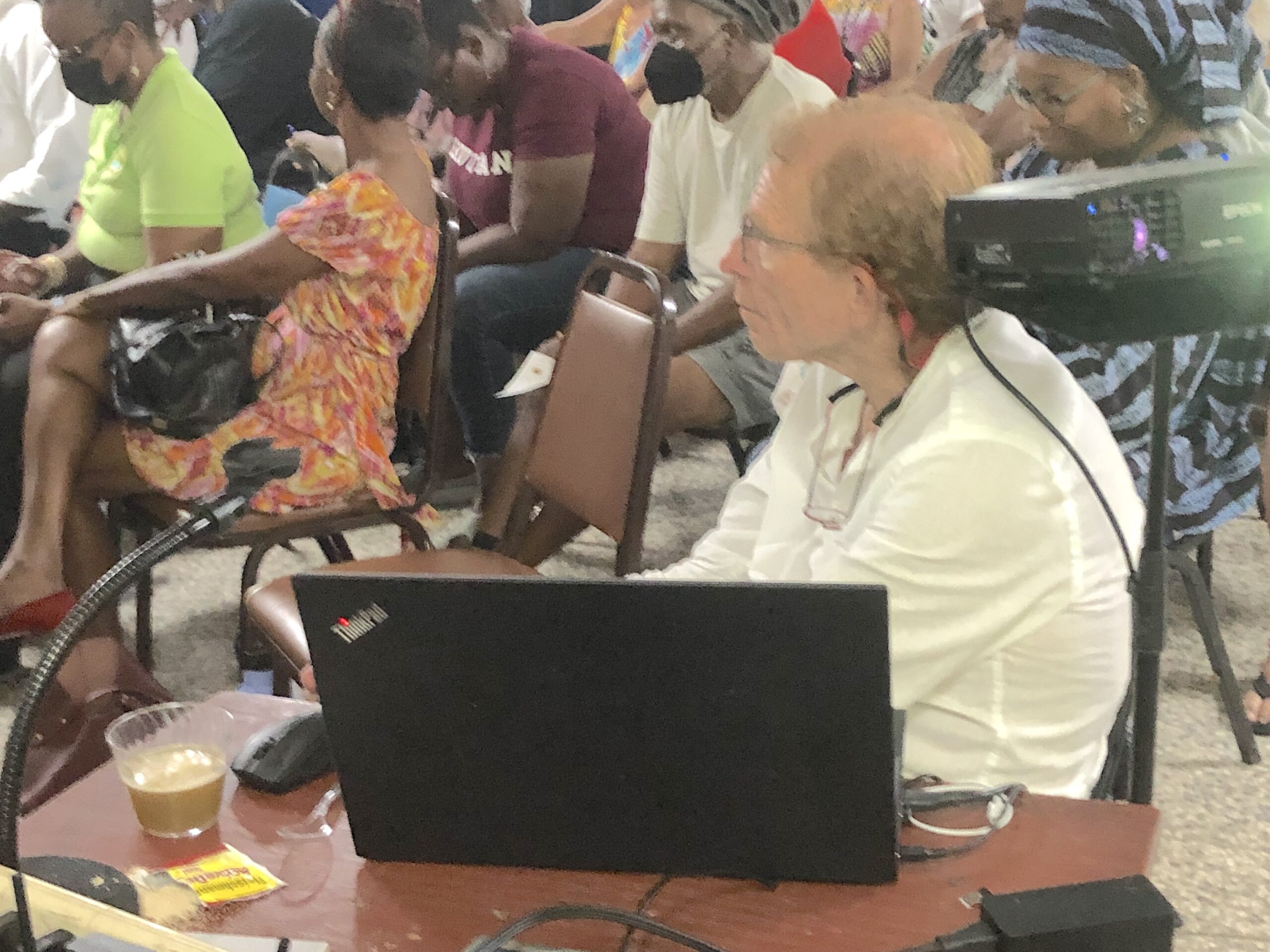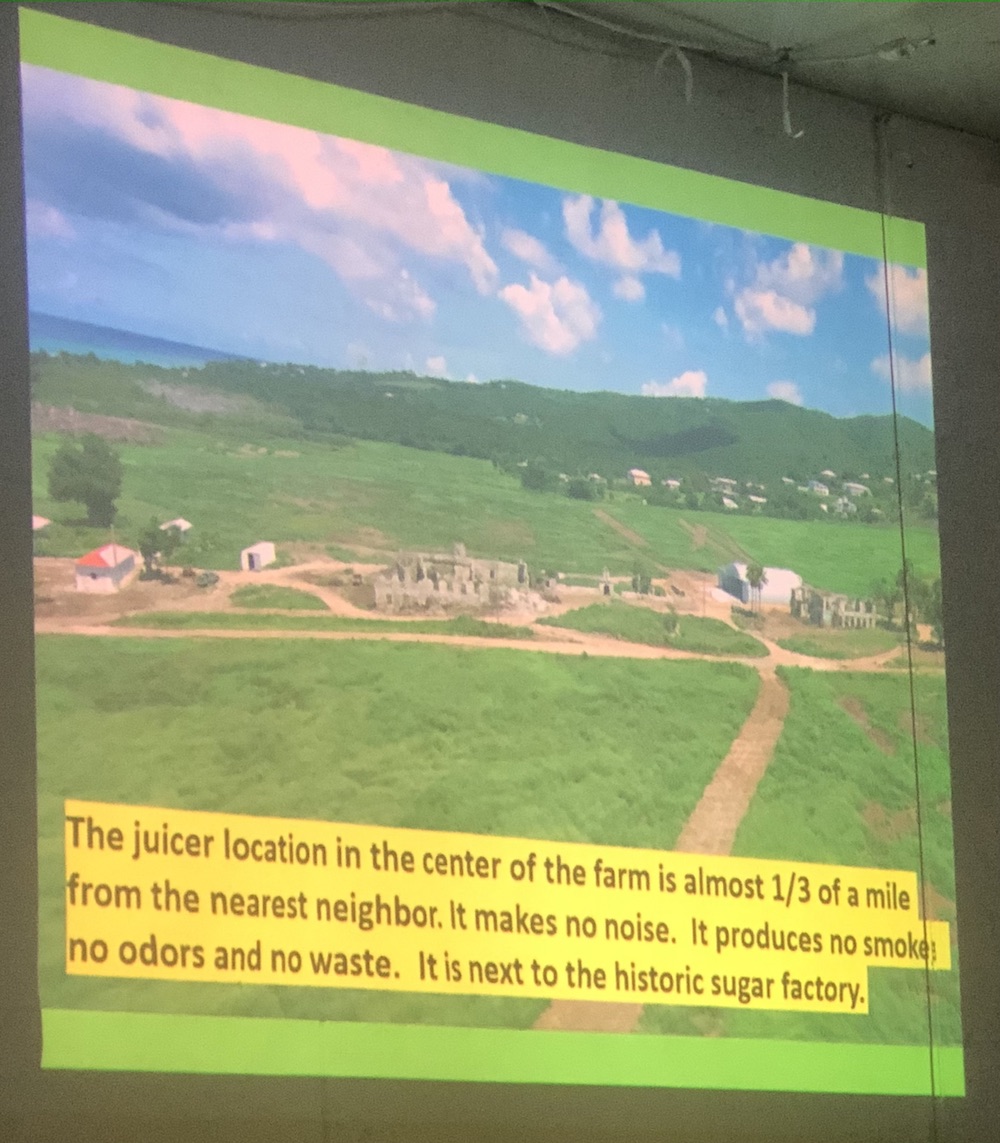An angry, sometimes disruptive crowd attended Sen. Kurt Vialet’s town hall meeting Monday night, hoping to get answers to their questions about a rum distillery planned for the fields north of Frederiksted at the Raising Cane Farm.

Vialet scheduled the town hall after meeting in his campaign headquarters with about 30 residents a week or so ago. They said they had tried to communicate with the land owner, various government agencies, and Vialet. The protestors made it clear they did not want the distillery in their neighborhood for a variety of reasons. They began their protest with a petition that was signed by more than 500 people.
When Vialet wrote an amendment and tagged it to Act 8965, which concerned the R.T. Park, the amendment allowed a rum distillery to be constructed on agricultural land. There was no public notice nor a public hearing — required by law — before the Senate voted approval and Gov. Albert Bryan Jr. signed the bill in April.
Sara Zuckerman, a direct neighbor to Raising Cane, told the Source residents wanted to know about the potential environmental impact created by manufacturing rum, pesticides sprayed by workers in gas masks, foul odors, and possible debris runoff onto the nearby beaches and shoreline. They were angry over permits issued by the V.I. Department of Planning and Natural Resources without public input or a hearing, and calls to DPNR were ignored, several said during the meeting.
The meeting began with a list of rules, including speaking respectfully and acting professionally. The group was told that anyone could speak and that those speaking should not be interrupted. However, the protest group was told they could not give a presentation they planned, nor could they talk about the farm — only the distillery.
Vialet began the meeting by saying his motivation for the amendment was to stimulate economic development and bring jobs to Frederiksted.
“It is not an industrial facility. It is a farm distillery that is going to produce less than 170,000 proof gallons,” he said, adding that Diageo and Cruzan Rum produce millions of gallons per year.
The senator said he planned to “offer an amendment to make sure there are no large-scale distillery developments on any farmland.” The legislation will define exactly what can be built, he said. Additionally, the source of the product must come from the farm, and distilleries must adhere to environmental and Coastal Zone restrictions.
“We’re here to listen to your concerns,” Vialet said, adding he requested Raising Cane owner Robert Apfel to discontinue construction on the site. One resident asked if Apfel agreed and asked him to restate his promise.

“We promised we would not do anything until everybody is happy, and the proof is in the pudding,” Apfel said.
There are two other micro-distilleries on St. Croix and two on St. Thomas, Vialet said. According to the governor’s State of the Territory address, he said there are plans to reopen the Brugal Rum Factory, also in Estate Prosperity. He ended his comments by advising the group to take their complaints to DPNR, which was invited to the meeting but did not attend.
Apfel showed a short video and talked while presenting a slide show. His first comments were about jobs — 18 people employed currently at $15 per hour with a target workforce of 45. He said he has invested more than $14 million in the farm, including $30,000 for an underground irrigation system.
The crowd of as many as 250 people started grumbling while Apfel talked about the cane growing on his farm and the varieties of sugar cane. He said he recognized that sugar cane is associated with enslaved generations, but the V.I. government spends $40 million a year on sugar for the large rum makers, and he thinks that money should stay in the territory. He said he hopes to provide some of the cane syrup to the big distillers.

After about 20 minutes, people in the crowd asked to speak, saying that more than half of the time allotted for the meeting had been used by Vialet and Apfel. The senator then asked the land owner to end his presentation.
The audience included scientists, lawyers, senators, and former DPNR commissioner and senator Alicia Barnes, who said the Legislature “circumvented” the DPNR re-zoning process prescribed by law. Barnes, speaking directly to Apfel, asked why he didn’t apply for use-variance or zoning from DPNR.
“We went to DPNR,” Apfel responded. “They said we would have to re-zone the entire parcel of land from agricultural to commercial — rezoning all 80 acres, and it would break my heart to turn agricultural land to industrial. We looked for another solution.”
Barns recommended repealing the law and revoking the permits. Then Apfel should go to DPNR and ask for a use-variance and follow the usual process, she said.
The crowd applauded and cheered her recommendation.
Olassee Davis, UVI professor, said Apfel should consult local scientists at UVI to protect himself and the community. He said a check and balance system is needed to test the water. He also supported a public hearing by DPNR. The only time the group was completely silent was when Davis spoke.
One resident, a former DPNR employee, said she was thrown off Apfel’s property when she appeared as a V.I. inspector, and other employees were locked out. She asked if the pesticide used on weeds at Raising Cane farm was 2-4D. While she claimed the chemical was formerly known as “Agent Orange,” the U.S. Environmental Protection Agency notes on its website that the two are not the same, and that Agent Orange has been banned since 1971.
Apfel said 2-4D had been used in the past, but none is needed now that the cane provides a canopy that keeps the weeds down.
When residents took the microphone, the vast majority said they did not want a rum factory anywhere in the area. In the end, they made it clear they wanted the amendment and the permits revoked until there is a proper public hearing and building plans are provided to the community.
Sen. Genevieve Whitaker told the Source after the meeting she has introduced such a bill to repeal Vialet’s amendment.
Zuckerman was one of the last to speak. She said she has been calling local and federal government agencies for two years to get information about the farm and distillery but received no responses.
“We have no idea what kind of pesticides, herbicides, chemicals are being put into the earth. You said, during your presentation, ‘I want to be.’ ‘I will be.’ ‘I want to be organic,’ but you’re not talking about what you did. What I’d like to see is a picture of the plans for the distillery. I’d like to see where it is. I’d like to see how close it is to CZM. That’s what we’re concerned about. I want to see plans. We’re not concerned about all the screen washing you’re doing up there. We are concerned with the plans for this distillery. So show me the plans.”
Editor’s Note: This story has been corrected to reflect that the pesticide 2-4D is not “Agent Orange.” The U.S. Environmental Protection Agency notes on its website that the two are not the same, and that Agent Orange has been banned since 1971.





